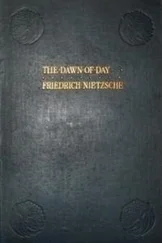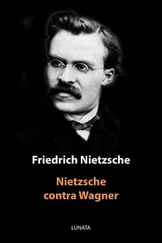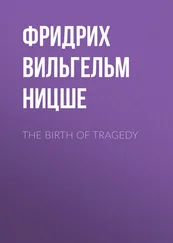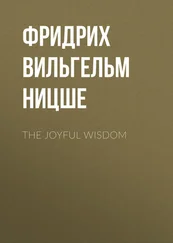5.
The artist of decadence. That is the word. And here I begin to be serious. I could not think of looking on approvingly while this décadent spoils our health—and music into the bargain. Is Wagner a man at all? Is he not rather a disease? Everything he touches he contaminates. He has made music sick.
A typical décadent who thinks himself necessary with his corrupted taste, who arrogates to himself a higher taste, who tries to establish his depravity as a law, as progress, as a fulfilment.
And no one guards against it. His powers of seduction attain monstrous proportions, holy incense hangs around him, the misunderstanding concerning him is called the Gospel,—and he has certainly not converted only the poor in spirit to his cause!
I should like to open the window a little:—Air! More air!—
The fact that people in Germany deceive themselves concerning Wagner does not surprise me. The reverse would surprise me. The Germans have modelled a Wagner for themselves, whom they can honour: never yet have they been psychologists; they are thankful that they misunderstand. But that people should also deceive themselves concerning Wagner in Paris! Where people are scarcely anything else than psychologists. And in Saint Petersburg! Where things are divined, which even Paris has no idea of. How intimately related must Wagner be to the entire decadence of Europe for her not to have felt that he was decadent! He belongs to it, he is its protagonist, its greatest name…. We bring honour on ourselves by elevating him to the clouds—For the mere fact that no one guards against him is in itself already a sign of decadence. Instinct is weakened, what ought to be eschewed now attracts. People actually kiss that which plunges them more quickly into the abyss.—Is there any need for an example? One has only to think of the régime which anæmic, or gouty, or diabetic people prescribe for themselves. The definition of a vegetarian: a creature who has need of a corroborating diet. To recognise what is harmful as harmful, to be able to deny oneself what is harmful, is a sign of youth, of vitality. That which is harmful lures the exhausted: cabbage lures the vegetarian. Illness itself can be a stimulus to life but one must be healthy enough for such a stimulus!—Wagner increases exhaustion— therefore he attracts the weak and exhausted to him. Oh, the rattlesnake joy of the old Master precisely because he always saw "the little children" coming unto him!
I place this point of view first and foremost: Wagner's art is diseased. The problems he sets on the stage are all concerned with hysteria; the convulsiveness of his emotions, his over–excited sensitiveness, his taste which demands ever sharper condimentation, his erraticness which he togged out to look like principles, and, last but not least, his choice of heroes and heroines, considered as physiological types (—a hospital ward!—): the whole represents a morbid picture; of this there can be no doubt. Wagner est une névrose . Maybe, that nothing is better known to–day, or in any case the subject of greater study, than the Protean character of degeneration which has disguised itself here, both as an art and as an artist. In Wagner our medical men and physiologists have a most interesting case, or at least a very complete one. Owing to the very fact that nothing is more modern than this thorough morbidness, this dilatoriness and excessive irritability of the nervous machinery, Wagner is the modern artist par excellence , the Cagliostro of modernity. All that the world most needs to–day, is combined in the most seductive manner in his art,—the three great stimulants of exhausted people: brutality , artificiality and innocence (idiocy).
Wagner is a great corrupter of music. With it, he found the means of stimulating tired nerves,—and in this way he made music ill. In the art of spurring exhausted creatures back into activity, and of recalling half–corpses to life, the inventiveness he shows is of no mean order. He is the master of hypnotic trickery, and he fells the strongest like bullocks. Wagner's success —his success with nerves, and therefore with women—converted the whole world of ambitious musicians into disciples of his secret art. And not only the ambitious, but also the shrewd …. Only with morbid music can money be made to–day; our big theatres live on Wagner.
6.
—Once more I will venture to indulge in a little levity. Let us suppose that Wagner's success could become flesh and blood and assume a human form; that, dressed up as a good–natured musical savant, it could move among budding artists. How do you think it would then be likely to express itself?—
My friends, it would say, let us exchange a word or two in private. It is easier to compose bad music than good music. But what, if apart from this it were also more profitable, more effective, more convincing, more exalting, more secure, more Wagnerian ?… Pulchrum est paucorum hominum. Bad enough in all conscience! We understand Latin, and perhaps we also understand which side our bread is buttered. Beauty has its drawbacks: we know that. Wherefore beauty then? Why not rather aim at size, at the sublime, the gigantic, that which moves the masses ?—And to repeat, it is easier to be titanic than to be beautiful; we know that….
We know the masses, we know the theatre. The best of those who assemble there,—German youths, horned Siegfrieds and other Wagnerites, require the sublime, the profound, and the overwhelming. This much still lies within our power. And as for the others who assemble there,—the cultured crétins , the blasé pigmies, the eternally feminine, the gastrically happy, in short the people—they also require the sublime, the profound, the overwhelming. All these people argue in the same way. "He who overthrows us is strong; he who elevates us is godly; he who makes us wonder vaguely is profound."—Let us make up our mind then, my friends in music: we do want to overthrow them, we do want to elevate them, we do want to make them wonder vaguely. This much still lies within our powers.
In regard to the process of making them wonder: it is here that our notion of "style" finds its starting–point. Above all, no thoughts! Nothing is more compromising than a thought! But the state of mind which precedes thought, the labour of the thought still unborn, the promise of future thought, the world as it was before God created it—a recrudescence of chaos…. Chaos makes people wonder….
In the words of the master: infinity but without melody.
In the second place, with regard to the overthrowing,—this belongs at least in part, to physiology. Let us, in the first place, examine the instruments. A few of them would convince even our intestines (—they throw open doors, as Handel would say), others becharm our very marrow. The colour of the melody is all–important here, the melody itself is of no importance. Let us be precise about this point. To what other purpose should we spend our strength? Let us be characteristic in tone even to the point of foolishness! If by means of tones we allow plenty of scope for guessing, this will be put to the credit of our intellects. Let us irritate nerves, let us strike them dead: let us handle thunder and lightning,—that is what overthrows….
But what overthrows best, is passion .—We must try and be clear concerning this question of passion. Nothing is cheaper than passion! All the virtues of counterpoint may be dispensed with, there is no need to have learnt anything,—but passion is always within our reach! Beauty is difficult: let us beware of beauty!…And also of melody! However much in earnest we may otherwise be about the ideal, let us slander, my friends, let us slander,—let us slander melody! Nothing is more dangerous than a beautiful melody! Nothing is more certain to ruin taste! My friends, if people again set about loving beautiful melodies, we are lost!…
Читать дальше











